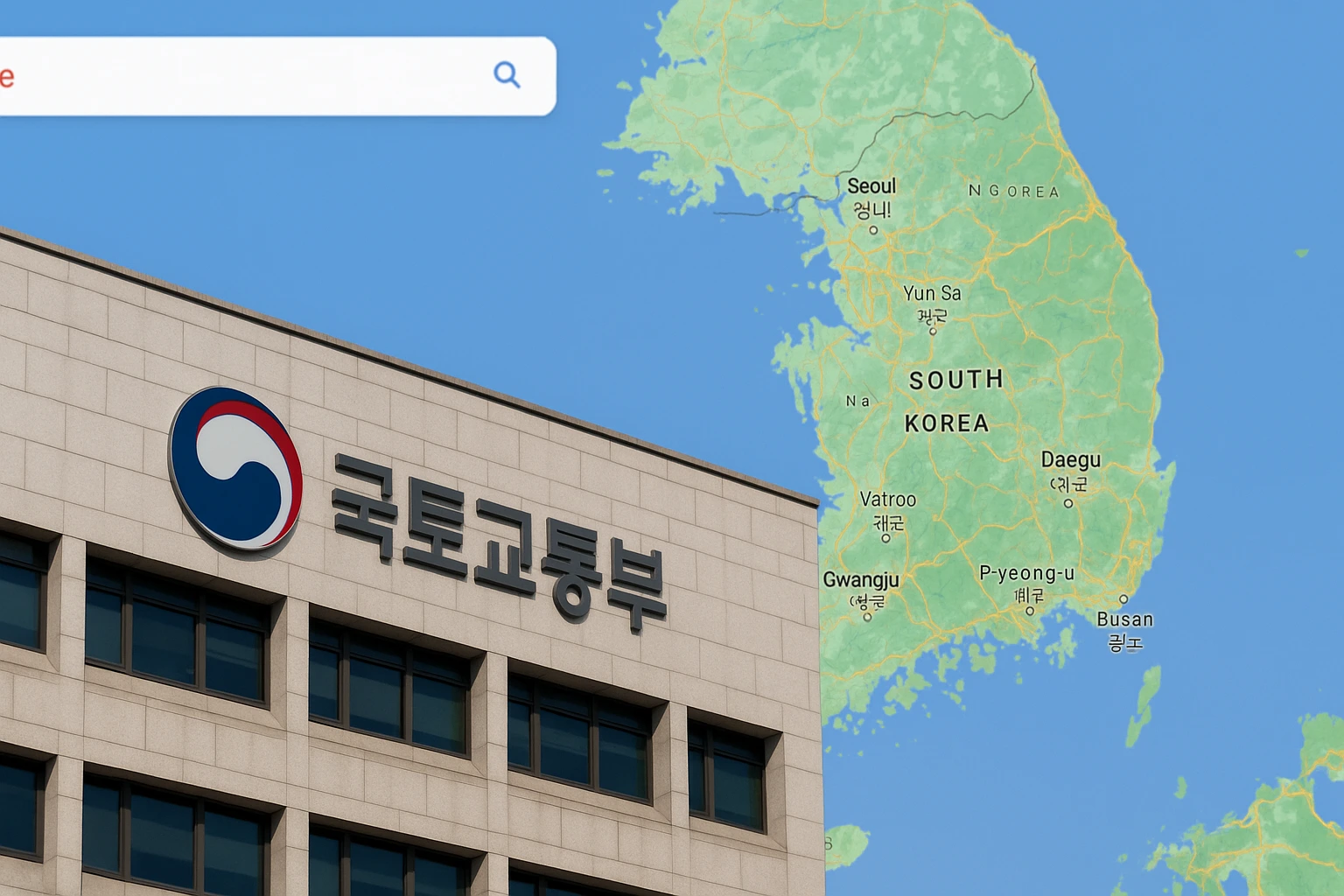SEOUL — South Korea’s Ministry of Land, Infrastructure and Transport said Tuesday it has once again delayed its decision on Google’s request to export detailed South Korean map data for use on overseas servers, citing incomplete documentation and unresolved security issues.
The ministry’s National Geographic Information Institute (NGII) granted the U.S. technology giant 60 additional business days until February 5, 2026 to submit supplementary materials before a final decision is made.
The extension marks the latest chapter in Google’s long standing struggle to gain approval to process South Korean map data outside the country.
Google, whose parent company is Alphabet Inc., has been requesting permission to export South Korean map data since 2007. The South Korean government rejected similar applications in 2007 and 2016, both times citing concerns over potential exposure of sensitive national security sites.
Under South Korean law, detailed geographic data cannot be transferred or stored on foreign servers without explicit government approval.
Authorities have long argued that such restrictions are necessary to protect the location of military installations, power plants, and other key infrastructure.
In September, Google said it would comply with South Korea’s security guidelines to ensure coordinate data within the country would not be visible to users globally and that sensitive sites would remain blurred.
Despite that assurance, the transport ministry said Tuesday that Google’s updated application did not reflect these adjustments.
“The inconsistencies between Google’s statements and the documents it submitted have made it difficult to proceed with a thorough review,” the ministry said in its statement.
Experts say the dispute highlights growing global tensions over digital sovereignty the right of nations to control data produced within their borders.
“South Korea’s caution reflects a broader concern among middle powers about how foreign tech companies manage sensitive data,” said Kim Hyeon-woo, a professor of information policy at Korea University.
“Map data can seem harmless, but in a geopolitical context, it intersects with issues of surveillance, defense, and national identity.” Industry analysts note that Google’s mapping services depend on consistent data standards worldwide.
Hosting South Korean map data on domestic servers, as currently required, can limit integration with global products such as Google Maps, Earth, and autonomous navigation systems.
“Google’s argument is largely technical,” said Jason Lee, a Seoul based technology analyst. “Without higher resolution map data like the 1:5,000 scale it’s requesting features like turn by turn navigation or 3D rendering simply don’t work as intended.”
Currently, Google operates in South Korea using 1:25,000 scale data, equivalent to 250 meters per centimeter, a format critics say is too coarse for accurate routing or location based services.
The company’s latest request seeks access to 1:5,000 scale data, which provides a resolution of 50 meters per centimeter the same level used by domestic map services from Kakao Corp. and Naver Corp.
South Korea’s map data restrictions are among the strictest in the OECD. Japan and Singapore, for example, allow foreign companies to process mapping information as long as they comply with local security regulations.
By contrast, South Korea requires both government licensing and onshore data storage, making it an exception in Asia’s digital ecosystem.
“The difference is rooted in South Korea’s unique security environment,” said Lim Soo-jin, a senior researcher at the Seoul Institute for Security Studies.
“Given its proximity to North Korea and the density of military infrastructure, mapping data takes on a level of sensitivity that few other countries face.”
For local users and developers, the outcome of the government’s decision could shape the future of location-based innovation in the country.
“I use Google Maps daily, but the navigation isn’t reliable here,” said Park Min-seo, a delivery driver in Seoul. “Sometimes it directs me to closed roads or fails to update construction zones. Korean apps are better, but they lack global reach.” Domestic tech companies have also weighed in.
A spokesperson for Kakao Corp., which operates the popular KakaoMap service, said the company “respects the government’s approach to data protection” but added that “consistent standards across platforms would ultimately benefit users and developers alike.”
Meanwhile, privacy advocates argue that allowing Google to export data could erode local control. “Once detailed geographic data leaves the country, oversight becomes nearly impossible,” said Lee Ji-won of the Seoul Digital Rights Center. “It’s not just about maps it’s about who owns and governs national information.”
The ministry’s decision comes as Seoul and Washington are finalizing discussions on trade and security cooperation, which analysts say could influence the outcome.
While the map data dispute is officially a domestic regulatory matter, observers note that it carries diplomatic undertones in the broader US South Korea technology partnership.
If Google meets the February deadline with compliant documentation, the government could reach a decision in early 2026. However, given past precedents, another rejection remains possible.
“The review process is procedural but also political,” said Cho Han-gyeol, a former official at the NGII. “South Korea wants to appear open to innovation while maintaining strict security protocols. Striking that balance has always been the challenge.”
As the February 2026 deadline approaches, South Korea’s decision on Google’s export request will test the government’s ability to reconcile data protection with digital competitiveness.
Whether it ultimately approves or denies the application, the outcome will likely shape how the country navigates its broader relationship with global technology giants in the years ahead.

Excellent breakdown of the topic. Really appreciate the detail!